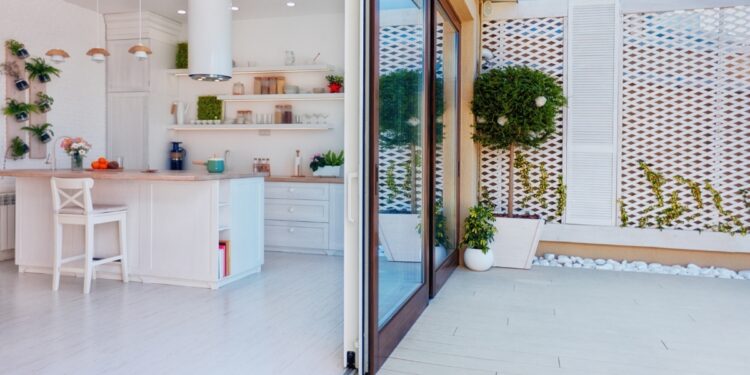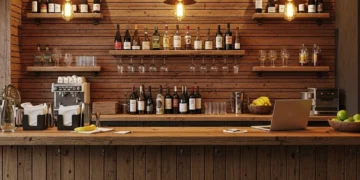Are you contemplating a home upgrade that combines functionality with aesthetic appeal? Sliding patio doors offer an exceptional solution for homeowners seeking to enhance their living spaces. These versatile entryways create a seamless connection between indoor and outdoor areas and flood your home with natural light, making spaces appear larger and more inviting. With numerous available options, selecting the perfect sliding patio doors requires careful consideration of various factors. This comprehensive guide will walk you through everything you need to know to make an informed decision.
Understanding Sliding Patio Doors
Sliding patio doors operate on a horizontal track system, typically featuring at least one fixed panel alongside one or more movable panels. Unlike hinged alternatives such as French or bifold doors, sliding mechanisms require no swing space, making them particularly suitable for areas with limited room. Their space-efficient design has made them increasingly popular for connecting living areas to gardens, patios, and outdoor entertaining spaces.
These doors present an ideal solution for homeowners with space constraints or those seeking to create an unobstructed view of their outdoor areas. Their straightforward operation and clean lines complement various architectural styles, from period properties to ultra-modern developments.
Key Benefits of Sliding Patio Doors
Maximising Space and Light
The space-conserving nature of sliding patio doors makes them particularly valuable in compact living environments. Unlike hinged alternatives that require clearance for their swing arc, sliding systems operate parallel to the wall, preserving precious floor space. This characteristic proves especially advantageous in smaller rooms, apartments, or areas where furniture placement might otherwise be restricted.
Enhanced Outdoor Connection
Sliding patio doors excel at creating a fluid transition between indoor living spaces and exterior environments. The wide aperture they provide when fully opened allows for effortless movement between your home and garden, making them perfect for entertaining or simply enjoying outdoor living during favourable weather.
Material Options for Sliding Patio Doors
uPVC Sliding Doors
Unplasticised polyvinyl chloride (uPVC) represents one of the most budget-friendly materials for sliding patio doors. These doors are durable and require minimal maintenance, resisting warping, rotting, and fading. Their excellent thermal properties help maintain comfortable indoor temperatures while potentially reducing energy costs.
Modern uPVC sliding doors are available in various finishes beyond traditional white, with anthracite grey emerging as a particularly fashionable choice for contemporary homes. This versatility allows them to complement diverse architectural styles and colour schemes. For homeowners seeking an affordable yet reliable option with good insulating properties, uPVC sliding doors present a compelling choice.
Aluminium Sliding Doors
Aluminium sliding doors have gained tremendous popularity for their sleek profiles and exceptional strength. The inherent robustness of aluminium allows for narrower frames and larger glass panels, maximising views and natural light. These doors resist corrosion effectively, making them suitable for coastal locations or areas exposed to harsh weather conditions.
The slim sightlines achievable with aluminium create a contemporary aesthetic that works beautifully in modern architectural contexts. Available in numerous powder-coated finishes, these doors can be customised to match or contrast with your home’s exterior and interior design scheme. While typically more expensive than uPVC alternatives, aluminium sliding doors offer superior longevity and visual appeal that many homeowners find justifies the additional investment.
Timber Sliding Doors
For properties with traditional character or homeowners seeking natural warmth, timber sliding doors provide unmatched aesthetic qualities. Wood brings inherent charm and authenticity that manufactured materials cannot replicate, making these doors particularly suitable for period properties or rustic design schemes.

However, timber requires more regular maintenance than synthetic alternatives to preserve its appearance and structural integrity. Periodic treatment with protective sealants is essential to prevent moisture damage and maintain the wood’s natural beauty. Despite these maintenance requirements, many homeowners consider the distinctive character and environmental credentials of timber worth the additional care.
Composite Sliding Doors
Composite sliding doors combine multiple materials to harness their respective advantages while minimising drawbacks. These innovative products often feature timber cores with aluminium cladding or incorporate advanced synthetic materials that deliver exceptional thermal performance alongside durability.
This hybrid approach creates doors that offer excellent insulation, weather resistance, and longevity with reduced maintenance requirements. Composite sliding doors represent an increasingly popular middle-ground solution for homeowners seeking a balance between aesthetic appeal, practical performance, and environmental considerations.
Energy Efficiency Considerations
When selecting sliding patio doors, energy efficiency should feature prominently in your decision-making process. High-performance doors can significantly impact your home’s thermal comfort and energy consumption. Look for products with low U-values (the lower the number, the better the insulation properties) and consider the following features:
Double or triple glazing provides superior insulation compared to single-glazed alternatives. Triple glazing offers the highest thermal performance but comes with additional weight and cost implications. For most UK homes, quality double glazing effectively balances insulation and practicality.
Security Features to Consider
Home security remains a primary concern for most homeowners, and sliding patio doors must incorporate robust protective measures. When evaluating options, prioritise the following security elements:
Multi-point locking systems distribute locking points along the door frame, making forced entry substantially more difficult. Look for doors with at least three locking points for enhanced security.
Toughened or laminated safety glass offers resistance against breakage and creates an additional barrier against intruders. Laminated glass holds together when shattered, providing persistent protection even if damaged.
Anti-lift mechanisms prevent doors from being lifted off their tracks, a common vulnerability in older sliding door designs. This simple but effective feature significantly enhances security with minimal impact on operation or aesthetics.
Additional security accessories such as patio door locks, security bars, or integrated alarm contacts can further strengthen your home’s defences. These supplementary measures provide extra peace of mind, particularly for properties in vulnerable locations.
Cost Considerations
Sliding patio door prices vary considerably based on material, size, glazing specification, and additional features. uPVC options typically represent the most affordable entry point, with prices starting around £1,500 including installation for standard sizes. Aluminium systems generally command higher prices, beginning from approximately £2,000 installed, reflecting their superior durability and aesthetic qualities.
For larger openings or bespoke requirements, costs increase proportionally. Premium slimline systems with minimal frames and maximum glass can reach £10,000 or more for substantial installations, particularly when incorporating advanced glazing technologies or automated features.
While the initial purchase price matters, consider lifetime value when deciding. Higher-quality doors typically offer extended service life, better thermal performance, and enhanced security, potentially delivering better long-term value despite higher upfront costs.
When budgeting, remember to include installation costs unless undertaking DIY fitting. Depending on complexity, professional installation typically adds between £200 and £1,000, though many suppliers include installation within their quoted prices.












